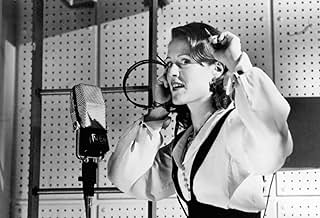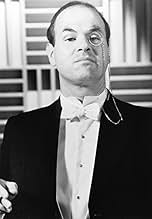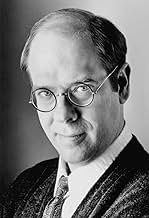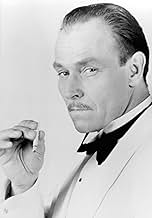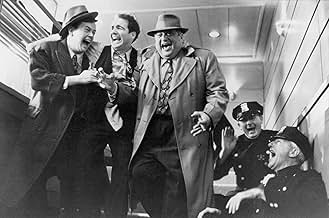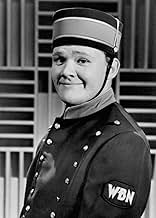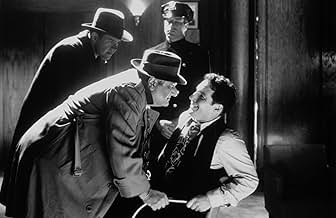NOTE IMDb
6,1/10
4,1 k
MA NOTE
Ajouter une intrigue dans votre langueA series of mysterious crimes threatens the existence of a new radio network.A series of mysterious crimes threatens the existence of a new radio network.A series of mysterious crimes threatens the existence of a new radio network.
- Réalisation
- Scénario
- Casting principal
Avis à la une
You can see what critics in 1994 were complaining about. You can get a headache from this movie. Gags are too snappy (too packaged), editing is too rapid (if someone trips over the shot is only just long enough to cover the actual tripping over - we don't see the crucial bit at the start where they don't trip over, or the bit at the end after they trip over), and there's not a single moment of still contemplation which would allow all the feverish activity to be as funny as it deserves to be. And while it's nice to see a film that doesn't milk its gags for more than they're worth, at least that would be a fault on the right side. Some of the comic ideas are just begging to be WALLOWED in. For example (I'm going to end up recommending this film, so if you don't want its best sight gag ruined, for God's sake skip the next paragraph)...
One of the radio serials is about an aristocratic English explorer and his native jungle sidekick. We hear the former saying things like `What ho, I mean to say, steady on, old chap', while the latter is going, `Ooga booga - me mongo mongo man' - then we see that the African is being played by a dopey-looking white man, and the Englishman is being played by a black (in a tuxedo). It's a glorious moment. We realise what if their roles had been reversed they would BOTH have been demeaned ... as it is, they merely look like a couple of prize wallies. Unfortunately, that's IT. If we'd seen more of this radio play - and got to watch the bemused/assured/disgusted/bored expressions on the faces of the two voice actors - it would have continued to be funny; it would have got even funnier. But we cut to some other zany thing or other and the moment is lost.
(To be fair, some throwaway gags - like the one involving the policemen and television - are true throwaway gags: snappiness suits them.)
But it works, on the whole. There are plenty of good jokes, many of which have been weakened by the style of presentation, but by no means destroyed. The radio performances are amazingly polished and varied - you'd swear that Lucas sent talent scouts back in time to 1939. Sure, the film wants to be more than a highly entertaining comedy variety show (it's also trying for murder mystery, love story, nostalgic reverie, and social commentary), so it fails on its own terms, but it IS a highly entertaining comedy variety show, which is good enough.
One of the radio serials is about an aristocratic English explorer and his native jungle sidekick. We hear the former saying things like `What ho, I mean to say, steady on, old chap', while the latter is going, `Ooga booga - me mongo mongo man' - then we see that the African is being played by a dopey-looking white man, and the Englishman is being played by a black (in a tuxedo). It's a glorious moment. We realise what if their roles had been reversed they would BOTH have been demeaned ... as it is, they merely look like a couple of prize wallies. Unfortunately, that's IT. If we'd seen more of this radio play - and got to watch the bemused/assured/disgusted/bored expressions on the faces of the two voice actors - it would have continued to be funny; it would have got even funnier. But we cut to some other zany thing or other and the moment is lost.
(To be fair, some throwaway gags - like the one involving the policemen and television - are true throwaway gags: snappiness suits them.)
But it works, on the whole. There are plenty of good jokes, many of which have been weakened by the style of presentation, but by no means destroyed. The radio performances are amazingly polished and varied - you'd swear that Lucas sent talent scouts back in time to 1939. Sure, the film wants to be more than a highly entertaining comedy variety show (it's also trying for murder mystery, love story, nostalgic reverie, and social commentary), so it fails on its own terms, but it IS a highly entertaining comedy variety show, which is good enough.
Unfairly and almost universally trashed, this is a charming and atmospheric imagining of a hectic night in the life of a Chicago radio station whose ambition it is to go national. The sponsors are a tough sell, nothing is going as planned, and everything is pure chaos, compounded by a mounting tally of murder victims.
"Radioland Murders" is one of the noisiest and busiest live-action movies I've seen, literally wall-to-wall in every frame with rapid-fire slapstick and pratfalls, and it does not quite work as a comedy, but even as a comedy, it's breezy and pleasant in the face of its frenzied pace -- not unlike an old Warner Bros. cartoon of the Merrie Melodies variety. Better, though, it works as a nostalgic notion of old-time radio. The staggering gaps in logic and plot are meant to be ignored, as this is fantasy; it embraces the idea of radio in its heyday as the missing link between paperback adventures and television, requiring the listener's imagination to do half the work, while television requires none of it. The movie amounts to what could likely be a 9-year old listener's visual projection of what he's hearing on the radio.
It's technically dazzling, too, with the lens darting into rooms, out of windows and around the action becoming its own frenetic participant, and there's some breathtaking shots of the exterior of the station, often accentuating its height and distance from the city street far below. Brian Benben and Mary Stuart Masterson might strike the same one or two chords throughout the movie, but they're likable, as is this movie. And Scott Michael Campbell is very funny as Billy the pageboy, a kind of wide-eyed Quentin Tarantino of the radio age; fast-talking (everyone in the film is fast-talking, actually) and easily distracted (the look on his face as he accidentally barges into the ladies' dressing room and becomes mesmerized by the sight of the topless actresses is priceless), his entire grammar and understanding of life is derived from the radio shows of which he has encyclopedic knowledge.
Finally, "Radioland Murders" closes with some wistfully ironic thoughts (the movie is mostly free of contemporary irony, with the exception of this and an unsuccessful line about warning labels on cigarette packs) about television (best summed up by three uniformed cops hypnotized by a cathode ray tube) and the immortality of radio. A movie more about myth than story, "Radioland Murders" is written in the scattershot style of the radio programs depicted. It might merely be a sanitized and moderate entertainment (particularly when viewed against something like "The Hudsucker Proxy"), but it's affectionate, features lively music, looks great, and is completely innocent.
"Radioland Murders" is one of the noisiest and busiest live-action movies I've seen, literally wall-to-wall in every frame with rapid-fire slapstick and pratfalls, and it does not quite work as a comedy, but even as a comedy, it's breezy and pleasant in the face of its frenzied pace -- not unlike an old Warner Bros. cartoon of the Merrie Melodies variety. Better, though, it works as a nostalgic notion of old-time radio. The staggering gaps in logic and plot are meant to be ignored, as this is fantasy; it embraces the idea of radio in its heyday as the missing link between paperback adventures and television, requiring the listener's imagination to do half the work, while television requires none of it. The movie amounts to what could likely be a 9-year old listener's visual projection of what he's hearing on the radio.
It's technically dazzling, too, with the lens darting into rooms, out of windows and around the action becoming its own frenetic participant, and there's some breathtaking shots of the exterior of the station, often accentuating its height and distance from the city street far below. Brian Benben and Mary Stuart Masterson might strike the same one or two chords throughout the movie, but they're likable, as is this movie. And Scott Michael Campbell is very funny as Billy the pageboy, a kind of wide-eyed Quentin Tarantino of the radio age; fast-talking (everyone in the film is fast-talking, actually) and easily distracted (the look on his face as he accidentally barges into the ladies' dressing room and becomes mesmerized by the sight of the topless actresses is priceless), his entire grammar and understanding of life is derived from the radio shows of which he has encyclopedic knowledge.
Finally, "Radioland Murders" closes with some wistfully ironic thoughts (the movie is mostly free of contemporary irony, with the exception of this and an unsuccessful line about warning labels on cigarette packs) about television (best summed up by three uniformed cops hypnotized by a cathode ray tube) and the immortality of radio. A movie more about myth than story, "Radioland Murders" is written in the scattershot style of the radio programs depicted. It might merely be a sanitized and moderate entertainment (particularly when viewed against something like "The Hudsucker Proxy"), but it's affectionate, features lively music, looks great, and is completely innocent.
Radioland Murders is a movie that should be seen more than once because it is so fast-paced and contains lots of inside jokes....it helps to have worked in radio (i've been a control board operator for 6 yrs) to catch some of the adsurdity. In my opinion, it's mostly about "timing" because in radio "dead air" is a no-no....one program must flow into another (with commercials in between, of course)....the audience has no idea of the confusion going on behind the scenes! Watch the contrast of the writers' hectic schedule and the actors performing whatever they are given so smoothly...this script is well-written, I think. Dissect the lines and they work, like when Billy tells Mr. Henderson, "that's quite a reach, Mr. H". Just say it out loud and it has a rhyme to it. I love the part where the cops are staring at the TV test pattern!! Some of the silly parts were a bit too long for my taste, but the movie works on many humorous levels. I also enjoyed the 1930 popular lingo as dialog in places. And the last script Mr. Henderson delivers IS a pip and pulls it all together!
This film is a niche film, in that it IS a who-dunnit, but deeper than that, there seems to be a gap between modern audiences and the pre-television world of pop-culture radio. This, in part, accounts for some of the lack of popularity this film experienced.
However...
This film is intriguing in that it features some great performances, manic and frantic dialog indicative of the behind-the-scenes and on-the-air intonations of the age, and a slick style which elevates this work far above the rating it currently enjoys here at IMDb.
The filming style is mesmerizing. The long shots of the outside of the radio building contributes to the feeling of isolation from the rest of the world, as the body count begins to accumulate. The sponsors just won't be sold on the station, everything which can go wrong is, and the station is dying to go into national syndication. All while the intrigue builds into suspense without generating the atmosphere of a thriller, which this is not. It was a difficult balance to maintain, but it never slips, never fails.
I have no idea why this was universally thrashed. This was delightful! It rates an 8.9/10 from...
the Fiend :.
However...
This film is intriguing in that it features some great performances, manic and frantic dialog indicative of the behind-the-scenes and on-the-air intonations of the age, and a slick style which elevates this work far above the rating it currently enjoys here at IMDb.
The filming style is mesmerizing. The long shots of the outside of the radio building contributes to the feeling of isolation from the rest of the world, as the body count begins to accumulate. The sponsors just won't be sold on the station, everything which can go wrong is, and the station is dying to go into national syndication. All while the intrigue builds into suspense without generating the atmosphere of a thriller, which this is not. It was a difficult balance to maintain, but it never slips, never fails.
I have no idea why this was universally thrashed. This was delightful! It rates an 8.9/10 from...
the Fiend :.
The (normally) Jazz number "And The Angels Sing" behind the ending credits works its way through half a dozen musical styles, including a wildly improbable Western Swing.
Be sure to listen to the end.
Be sure to listen to the end.
Le saviez-vous
- AnecdotesGeorge Lucas has stated that the two main characters, Roger and Penny Henderson, are actually the parents of Richard Dreyfuss' character Curt Henderson from American Graffiti (1973); making this film a bit of a semi-prequel.
- GaffesThe portrait in Gen. Whalen's office shows the general wearing a service dress green uniform which was not adopted by the U.S. Army until the mid-1950s. In 1939, when the movie is set, the general would have worn a khaki uniform.
- Citations
Penny Henderson: I told Dexter not to smoke. If you ask me, they oughta put warning labels on those packages.
- Bandes originalesThat Old Feeling
Written by Lew Brown and Sammy Fain
Performed by Rosemary Clooney
Courtesy of EMI Feist, Inc. and Bienstock Publishing Co.
Meilleurs choix
Connectez-vous pour évaluer et suivre la liste de favoris afin de recevoir des recommandations personnalisées
- How long is Radioland Murders?Alimenté par Alexa
Détails
Box-office
- Budget
- 15 000 000 $US (estimé)
- Montant brut aux États-Unis et au Canada
- 1 316 865 $US
- Week-end de sortie aux États-Unis et au Canada
- 835 570 $US
- 23 oct. 1994
- Montant brut mondial
- 1 316 865 $US
- Durée1 heure 48 minutes
- Couleur
- Mixage
- Rapport de forme
- 2.39 : 1
- 2.35 : 1
Contribuer à cette page
Suggérer une modification ou ajouter du contenu manquant

Lacune principale
By what name was Radioland Murders (1994) officially released in India in English?
Répondre

